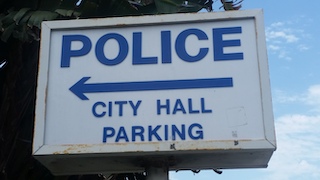Our client had served in the U.S. Navy from 2010 to 2017 as an avionics technician. He had been deployed on an aircraft carrier, where he serviced F/A-18D Hornets, S-3 Vikings and even EA-6B Prowlers.
Now 29 and two years after leaving the Navy, he ran into a bit of trouble in Hermosa Beach after a night of drinking. After he was released from the Hermosa Beach jail, he called Greg Hill & Associates. When the client explained his military background, Greg and the client had an instant bond because Greg flew over 1,000 hours in the EA-6B, even in combat during Operation Desert Storm.
The client described how he had been drinking in downtown Hermosa Beach. He then decided to leave to return home. It was about midnight.
He did not get too far. After leaving the parking lot near downtown, he ran into a parked car on Hermosa Avenue and broke his nose from his airbag hitting him so hard. The details were vague to him, but he described how he had been bleeding quite a lot from his nose and was taken to the hospital for treatment. He knew his Ford Fiesta was totaled.
When the client spoke to Greg a few days after the event, he did not know his blood alcohol content (BAC), but anticipated that it would be far above the legal limit.
The client had called several other attorneys before calling Greg, but Greg was the only one to mention resolving the case through military diversion under Penal Code § 1001.80.
 Police Station Hermosa Beach
Police Station Hermosa Beach
Greg then explained the four requirements that a defendant must meet before a judge places a defendant on military diversion, which allows one to avoid a conviction and, if successfully completed, have the case dismissed.
The requirements are:
- that defendant is on active duty or is former active duty serviceman in any of the four branches of service;
- that defendant suffers from a service-related condition such as PTSD, traumatic brain injury, substance abuse, an anxiety disorder or some other mental health disability arising from military service (this may be stated on the DD-214)
- that the person waives his Sixth Amendment right to a speedy trial to participate in the diversion program; and
- that defendant enroll in and complete a program of counseling, commonly through the VA or another court-approved provider, to treat his or her service-related condition.
A link between the crime at issue and the service-related disability (a “nexus”) is not strictly necessary. The judge need only find that it “may be related.”
Military diversion can last up to two years. Upon completion of the program, the case is dismissed and the judge orders that defendant’s file in the case, as well as the underlying police report, are ordered sealed and destroyed.
To request military diversion for the client, Greg requested the client’s DD-214 form to document his military service.
The client then mentioned that he had been already receiving treatment for alcohol abuse through the Long Beach VA. Greg suggested he resume or continue that treatment immediately.
Greg then went to the Torrance Superior Court on the day for the arraignment, bringing with him the client’s DD-214, his proof of treatment in the Long Beach VA and proof of attending AA meetings, as Greg suggested just because judges do have discretion to deny such a request for military diversion.
Greg read the police report for the first time once getting to court. Our client had a 0.24% BAC. According to the police officer writing the report, our client stated, “I drank too much.”
Greg then discussed the case with the Redondo Beach City Prosecutor handling the case to advise her that our client was a U.S. Navy veteran and we planned to ask the judge to impose military diversion under Penal Code § 1001.80. We showed the prosecutor the client’s DD-214 and a letter from the Long Beach Veteran’s Administration showing he was receiving treatment for an alcohol abuse syndrome.
The prosecutor agreed that it certainly appeared he was eligible for military diversion, so Greg proceeded to discussing terms for the diversion that the judge could impose. Due to the client’s BAC being above 0.15%, the nine-month alcohol awareness program (AB1353) seemed appropriate, but otherwise, treatment through the VA in Long Beach would probably suffice.
The client would also have to pay the booking fee for the City of Hermosa Beach and restitution in any amounts for the property damage to the car our client hit if above insurance payments received.
The judge then called the matter. Greg then made an oral motion for imposition of military diversion under Penal Code 1001.80 and showed the judge the documentation mentioned above. The judge agreed that our client was eligible for military diversion and then moved onto the terms, agreeing with all terms Greg and the prosecutor had discussed, but adding an obligation for our client to attend the Mothers Against Drunk Driving (MADD) victim impact panel.
The term of diversion would be two years.
Greg returned to the office and e-mailed the client, describing the judge’s order allowing military diversion. This was something of a windfall for our client because there was no conviction, so his fees and fines were zero and no order to install the IID was triggered by a conviction.
For more information about veterans programs in criminal cases, please click on the following articles:
 Police Station Hermosa Beach
Police Station Hermosa Beach